Hydrogen water is exactly what you would think it is. It's water that has hydrogen in it, and it has a lot of amazing health benefits that are still being discovered by scientists today.
If you ever took a middle school science class, you might be a little confused. Doesn't all water have hydrogen? Isn't that why it's called H2O? Don't worry, you're not going crazy. Every single water molecule is made up of two hydrogen atoms and one oxygen.
With hydrogen water, you have your regular H2O molecules, but you also have molecules that are completely separate, known as molecular hydrogen.
What is Molecular Hydrogen?
Check out the periodic table below. There are 118 elements, each with its own unique properties. If you look at the top left corner, you will see an element that says "H." That stands for hydrogen.
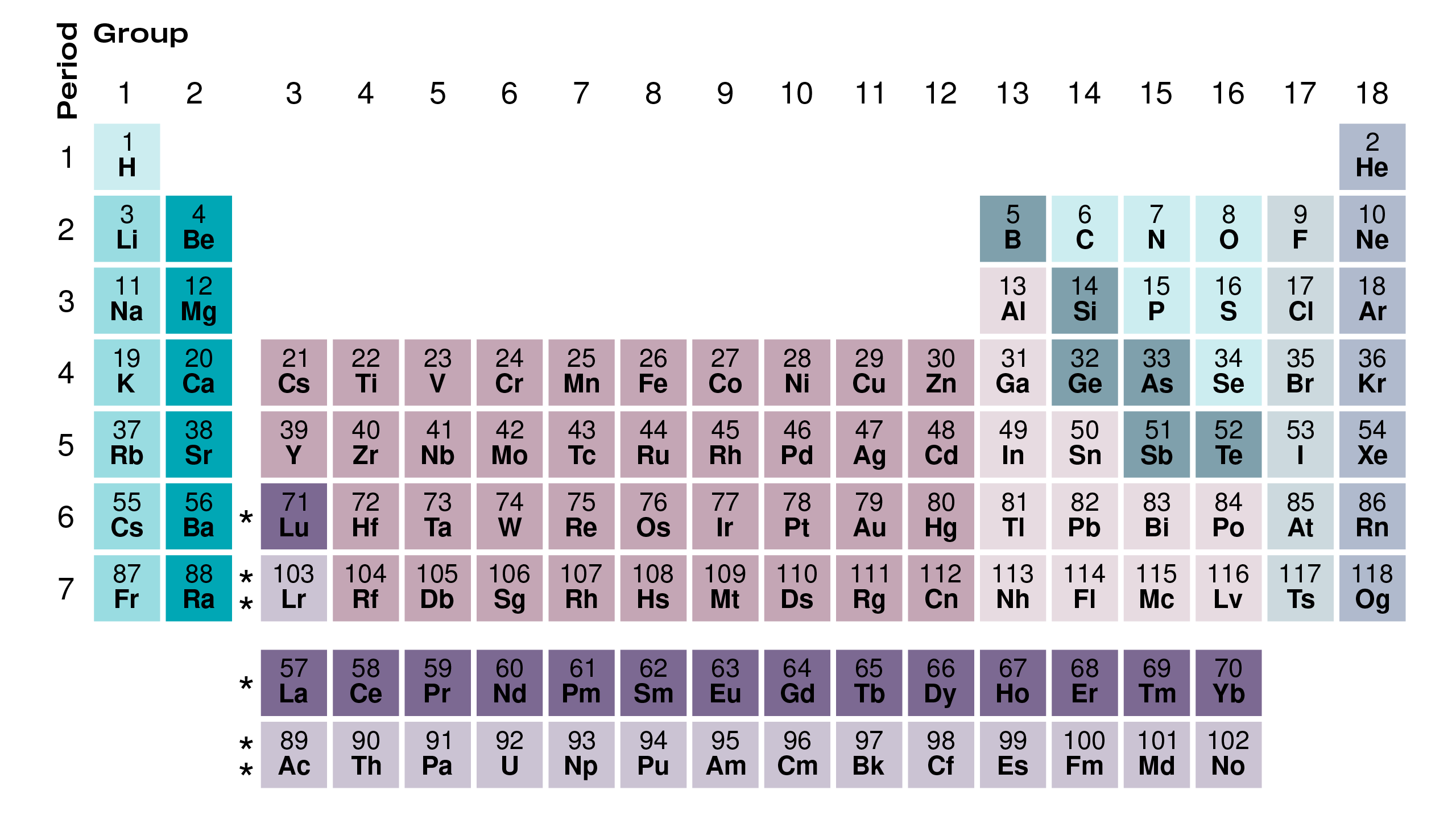
You may have noticed that hydrogen is element number one. That is super important! It doesn't mean it's the best element of all --- though we think it's pretty damn cool. What it does mean is it's the smallest one.
At the most basic level, every element is made up of atoms. Most atoms have three parts to them --- protons, neutrons, and electrons. A proton is a positively charged particle, and the amount each element has corresponds to its spot on the periodic table.
So hydrogen being element number 1 means it has only one proton. Not only that, it is the only element that does not contain a neutron (which has a neutral charge). This means it is the lightest element by a long shot. In fact, the next element is helium, and it is four times heavier!
Now, this explains what hydrogen is, but it doesn't explain what molecular hydrogen is. That is what you will find in hydrogen water. But before we explain that....
A Chemistry Lesson About Electrons
You remember how we were talking about positively charged protons? Well there are also negatively charged particles called electrons. For an atom to be neutral, it has to have the same number of protons as it does electrons.
With that being said, a single hydrogen atom has 1 proton and 1 electron. It looks something like this.
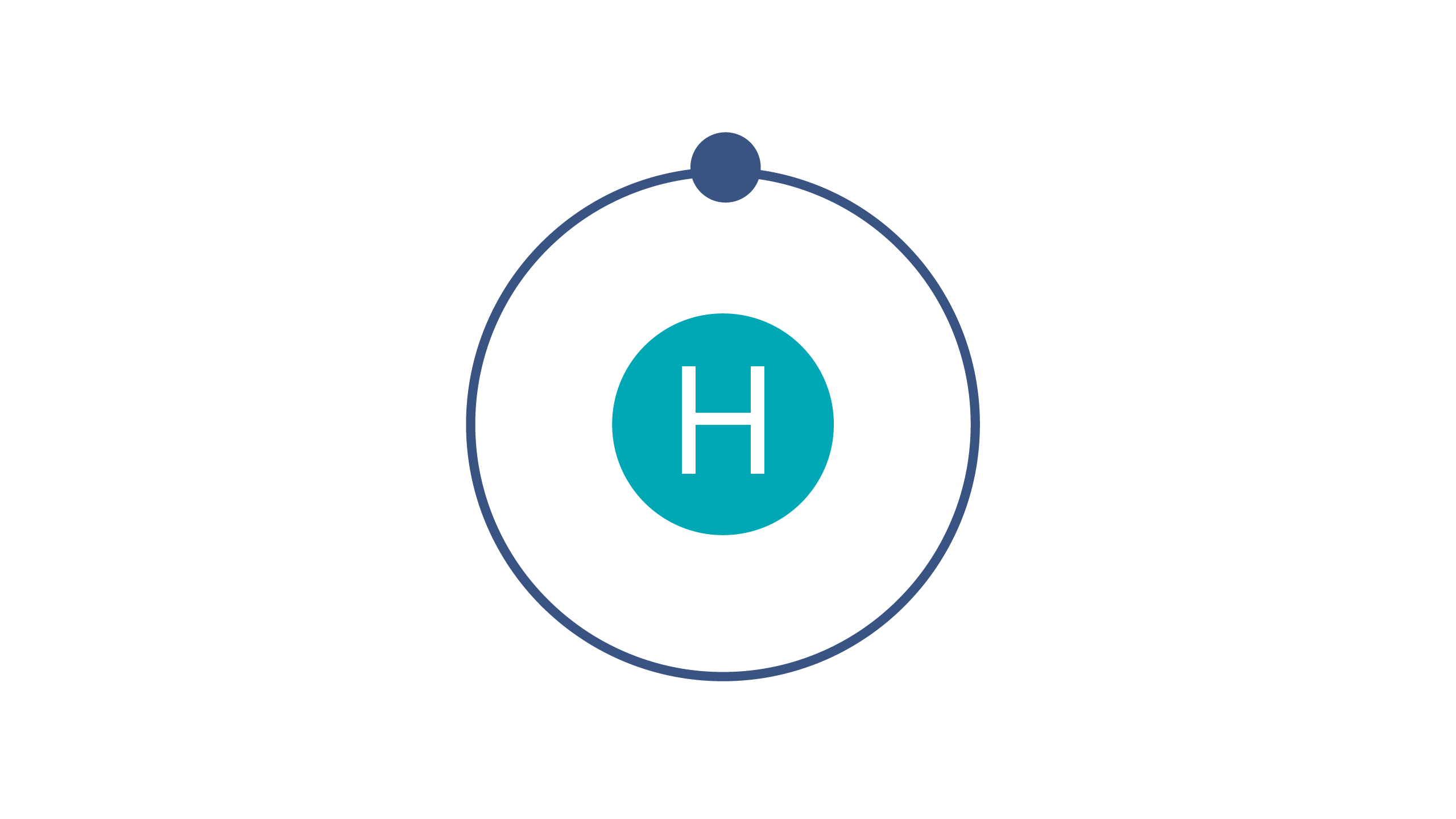
Notice there's a single electron going around in a circle. That circle is called an electron shell. In order for an atom to be stable, its outer electron shell has to have a certain amount of electrons. The biggest element has seven shells, but the smallest --- hydrogen of course --- has only one.
In hydrogen's one shell, there is only one electron. In order for the shell to be full, it needs two. This means it needs to bond with another element, which can share that electron. So if there are other hydrogen molecules around --- each of them with only one electron --- they'll bond with each other to become a stable molecule.
That molecule of two hydrogen atoms put together is what we refer to as molecular hydrogen, and that is what you will find in your hydrogen water.
Even with two hydrogens together, it's still a very small molecule. This means that when you drink hydrogen water, each molecule can get into your cells easily and work its magic!
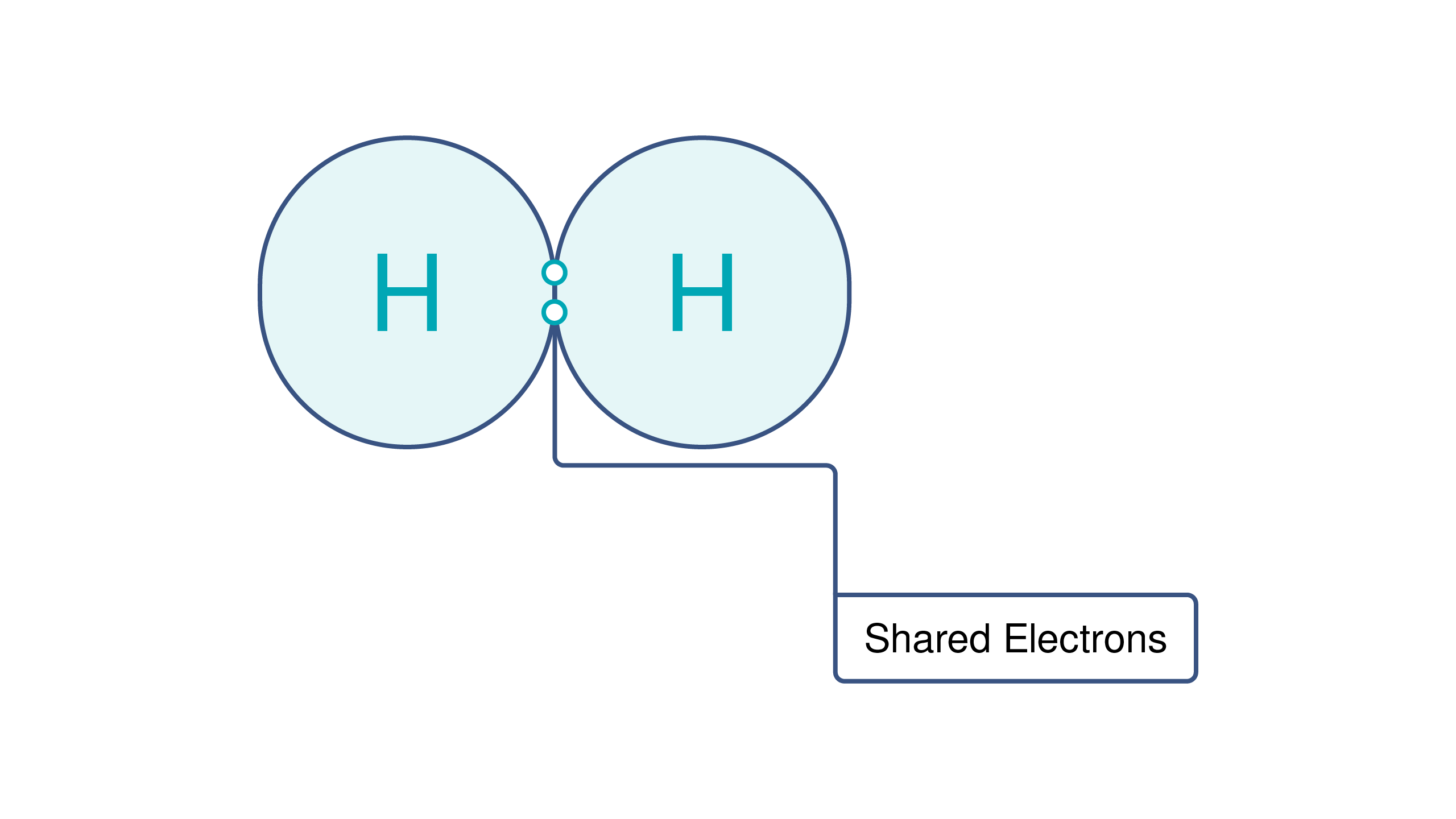
Free Radicals: The Villains In Your Body
Before we talk about what molecular hydrogen actually does, we need to talk about a molecular supervillain, free radicals.
Free radicals are unstable molecules that often cause havoc in your body. As we said before, molecules have a certain amount of electrons they need in their outer shell in order to be stable. If they don't have it, they will bond with other elements until they are satisfied.
And that is exactly what free radicals do. They enter your cells and bond with whatever they can find. They tear apart bonds from existing molecules and bond with the atom they took away.
The molecule that is created from the new bond is now stable, but the molecule that was taken apart isn't. It's now a free radical with an outer shell that needs another electron, and it needs to form another bond.
Now, you have the original free radicals pulling molecules apart PLUS new free radicals that are destroying other stable molecules. If there are no chemicals to provide balance to your body, this can create oxidative stress, and that can cause quite a bit of damage to your body.
Antioxidants: The Heroes In Your Body
Antioxidants are the chemicals that can provide the balance you need to prevent that oxidative stress. You've probably heard about these. Antioxidants are often talked about in the media as substances that have health benefits.
These are stable molecules that donate their electrons to free radicals. This makes it so the free radical isn't "free" to pull apart the molecules that make up the cell.
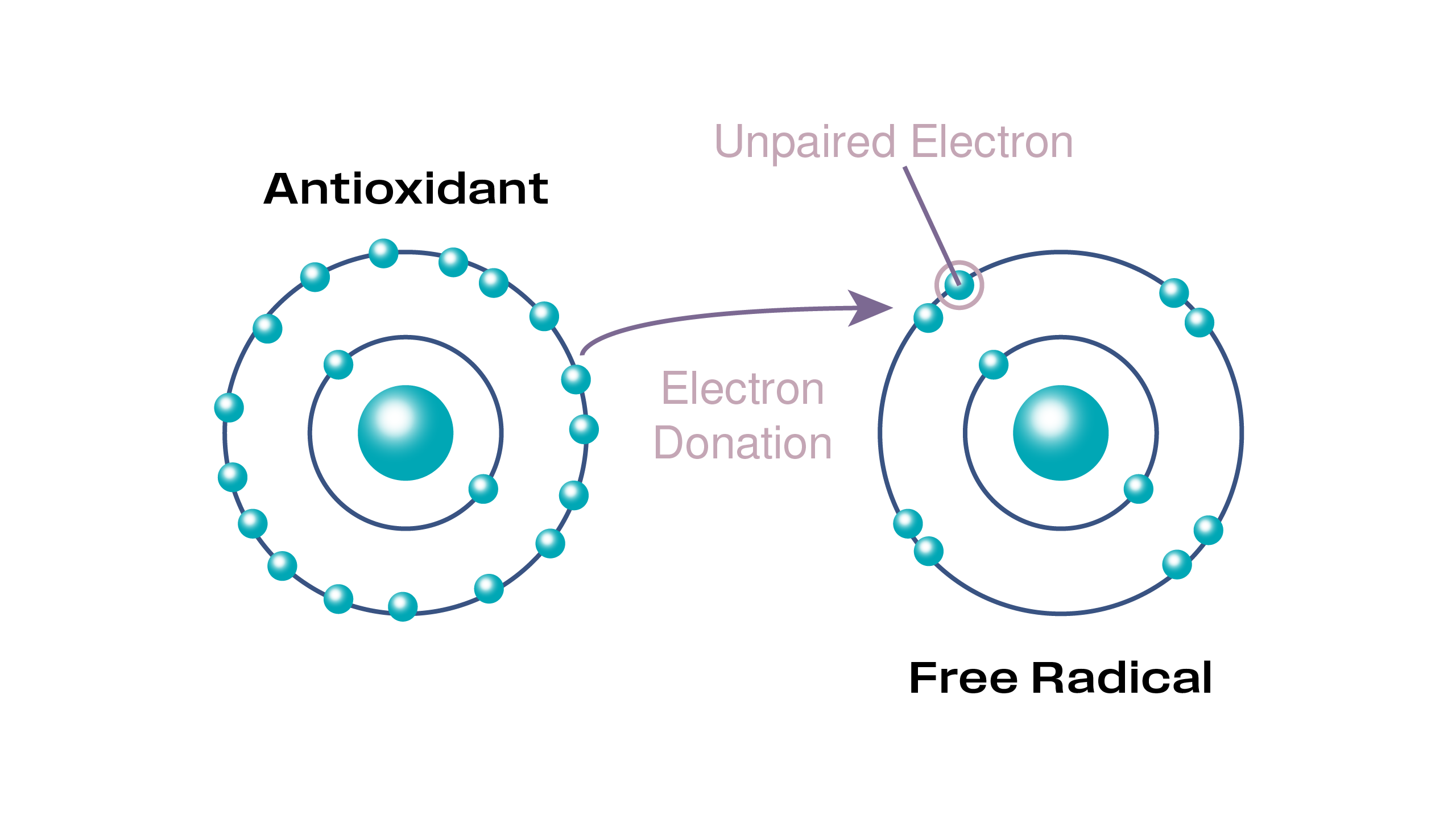
Antioxidants come from a variety of healthy foods that you can eat, including berries, dark leafy greens, broccoli, and even cinnamon. You can also ensure your body is getting its natural antioxidants through healthy lifestyle choices like exercising, getting the proper amount of sleep, and avoiding smoking.
Health Problems With Oxidative Stress
Okay, maybe we exaggerated a bit by saying free radicals are supervillains. They aren't always bad. They're often formed during normal cellular processes. They can fight infection-causing pathogens, and they are part of the process of regular cell death called apoptosis. Without it, your body would not function normally. In fact, a lack of this kind of cell death is often associated with cancer.
However, if you have too many free radicals and too few antioxidants, that is when your body is in a state of oxidative stress. This can damage your DNA, fatty tissue, and proteins that are present in your body.
If left unchecked, oxidative stress is associated with a number of health problems including heart disease, Alzheimer's, diabetes, high blood pressure, Parkinson's, and even cancer.
Oxidative stress is also associated with aging. In fact, there is a free radical theory of aging, which proposes that everything we associate with it happens because of oxidative stress that damages our tissue and cells.
Where Does Hydrogen Fit Into The Equation
Remember how we were talking about molecular hydrogen earlier? Well, it has been shown to enhance your body's antioxidant capacity, neutralizing the harm that free radicals do and lessening the effects of oxidative stress.
Not only that, hydrogen might even be a better therapeutic antioxidant than others out there because of its selective approach. It has been shown to target a free radical called hydroxyl, which is among the most cytotoxic oxygen radicals (cytotoxic is science speak for "it can be especially damaging"). In neutralizing that one, it has also been shown to leave the beneficial free radicals alone.
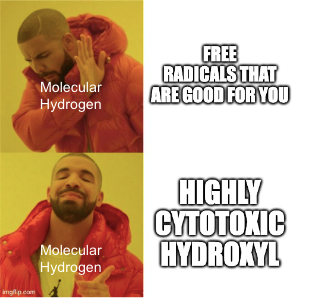
Hydrogen water might call him on his cell phone.
How Hydrogen Acts As an Antioxidant
Scientists don't know exactly why this works, but the consensus is that the bond that molecular hydrogen --- including what you'd find in hydrogen water --- has is easily broken apart by free radicals. When this happens, the radical will bond with one of the hydrogen atoms.
This leaves the other hydrogen atom alone as a radical itself. It's less harmful than others, known as reactive oxygen species or ROS --- which hydroxyl is part of. This one will likely pull another hydrogen atom from water, starting its own chain reaction until eventually a hydrogen atom reacts with a hydroxyl molecule to create more water.
It's Not Just An Antioxidant
Drinking hydrogen rich water has been shown to have antioxidant health benefits, but our favorite little molecule does more than relieve oxidative stress. It's also a great signaling molecule, specifically targeting protein kinases, which activate proteins.
How Does Signaling Work
Cells have different receptors. When the right molecule --- known as a ligand --- hits that receptor, it starts a process in which a protein kinase activates the protein. This can alter the way a cell functions for better or for worse.
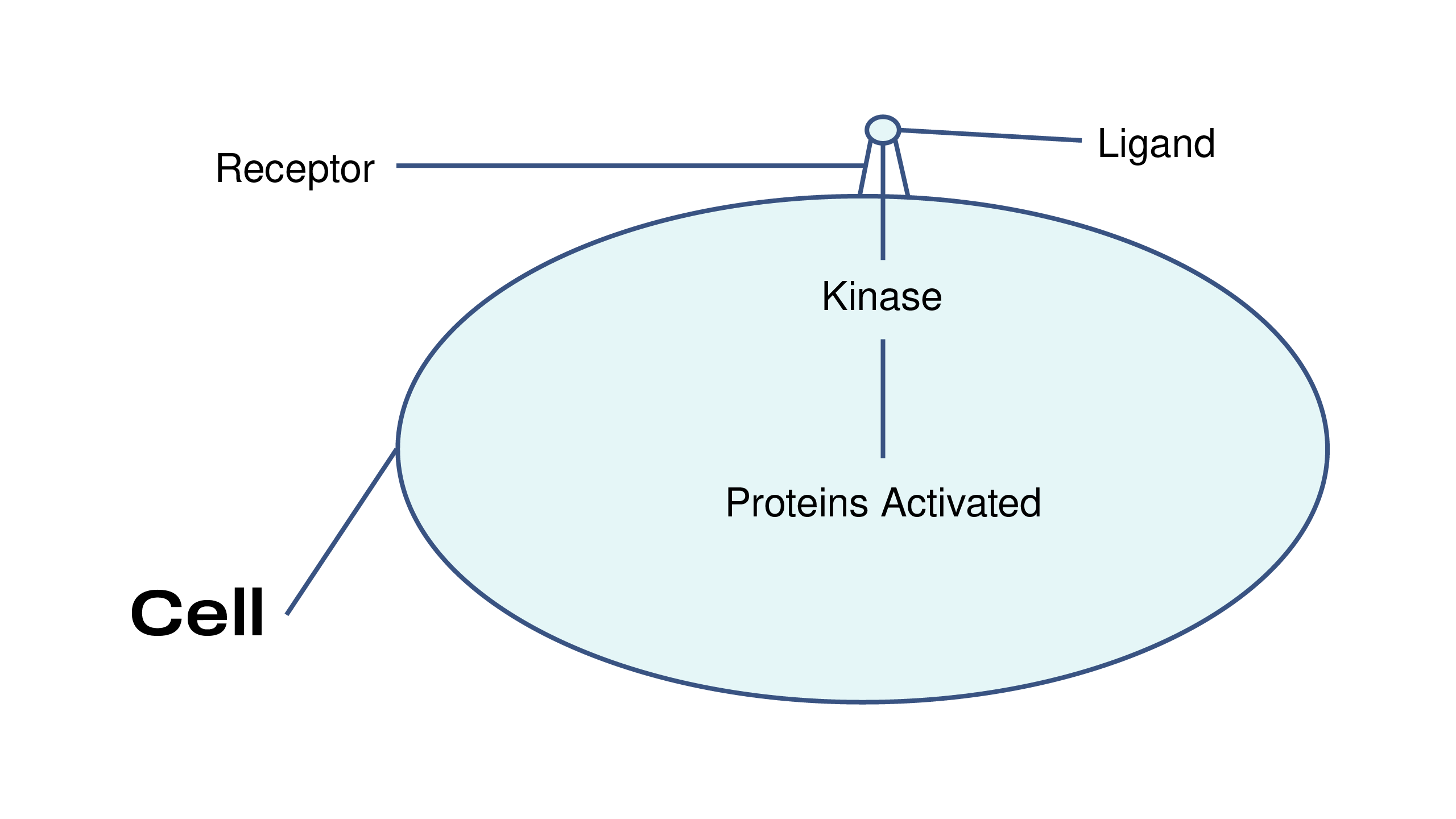
When you are drinking hydrogen water, some of the hydrogen molecules will be used to increase your antioxidant capacity. However, some of it will also be used to assist those protein kinases by signaling them, and some of what it does here can have some health benefits.
Signaling Benefit Example From Hydrogen Gas
One example of health benefits through the signaling aspect of hydrogen comes from a 2020 study from China. Researchers didn't use hydrogen water. They used gas instead.
A group of scientists looked into the effects of hydrogen gas on a type of brain damage that affects newborn babies called neonatal hypoxic–ischemic encephalopathy (HIE). It happens when there isn't enough oxygen in the brain around the time of birth. Among the children who survive, about 25% have severe impairments on their sensory, cognitive, and motor skills.
The scientists looked at rats with a brain injury, and watched how hydrogen gas affected them. If it was effective, then maybe it would be a good treatment for neonatal HIE.
They found that when the animals inhaled hydrogen gas, they showed improvements in their injuries. In this particular study, the scientists also looked at how molecular hydrogen affected various signaling pathways. They found that the hydrogen activated different kinases and increased the expression of a gene called HO-1, which aids some of the effects of oxidative stress.
Hydrogen Rich Water For Metabolic Syndrome
In a 2010 U.S. study, scientists wanted to look at the effects of drinking hydrogen water on people who might have what's called metabolic syndrome. The National Institutes of Health defines metabolic syndrome as "a group of conditions that together raise your risk of coronary heart disease, diabetes, stroke, and other serious health problems." Some of the conditions include obesity, hypertension, insulin resistance, and dyslipidemia --- which is when the lipids in your body are imbalanced.
The researchers behind this study say that oxidative stress is a possible factor behind metabolic syndrome. They wanted to see whether hydrogen rich water would reduce some of the effects of that.
They got 20 people --- each with symptoms of metabolic syndrome --- to participate. All of them were given 500 ml bottles of water. Overnight, they would place sticks of magnesium in five of those bottles. This would induce a chemical reaction that created hydrogen rich water.
The next day, they would drink 300-400 ml of hydrogen water at five specific times --- one hour before breakfast, one hour before lunch, two hours after lunch, one hour before dinner, and a half hour before going to bed. That night, they would reuse the magnesium sticks on another 500 ml bottle of water, creating even more hydrogen rich water that they would drink the next day.
This process went on for eight weeks. The subjects (which is science speak for people who participated in the study) visited a clinic four times over that period. One of those times was to take baseline measurements. This was to evaluate how their bodies were doing before the hydrogen water treatment.
This is an important step because in most studies, there is one group that is given treatment and another that isn't. The latter is called a control group --- sometimes referred to as a placebo group. In order to prove whether the treatment works, the data needs to be looked at from both.
In this study, there was no control group. To show the efficacy of drinking hydrogen rich water on potential metabolic syndrome, various measurements were compared. These included those taken before the hydrogen water treatment (baseline) and at weeks four and eight.
Results of Metabolic Syndrome Study
Researchers found that when the subjects with potential metabolic syndrome were drinking hydrogen rich water, their urine showed a 39% increase in an enzyme called superoxide dismutase (SOD). This enzyme aids in the antioxidant defense against certain free radicals and is associated with reducing some of the effects of oxidative stress.
In addition, they also found a 43% decrease in thiobarbituric acid reactive substances, or TBARS. These are byproducts formed from oxidative stress. So a reduction in these is good news.
They also found that hydrogen water increased HDL cholesterol. Now, you might be thinking that is bad, but it's actually good. One of the main health benefits is protection from cardiovascular disease. On the flip side, low HDL can increase your risk of getting heart disease.
The scientists behind this study concluded that drinking hydrogen water has potential in treating metabolic syndrome.
Drinking Hydrogen Water To Treat Interstitial Lung Disease
A very recent study in China looked at whether hydrogen rich water would be better at treating interstitial lung disease (ILD) than what is currently being used to treat it. In this disease, your lung tissue gets scarred, which makes it hard for you to breathe and get the right amount of oxygen into the bloodstream.
Oxidative stress is a big factor in ILD, and the treatment that has been used for it is an antioxidant called N-Acetylcysteine or NAC. This has been an effective treatment for cognitive decline that is associated with the disease.
However, there are certain aspects about NAC that aren't great. For one thing, it doesn't have a lot of bioavailability when it is given in higher doses. This means it's not very effective at getting to where it needs to go. Therefore, it can't increase the antioxidant capacity to the extent that the lungs need.
Another problem is something the the molecules in hydrogen water address. NAC will get rid of the villainous free radicals, but it will also get rid of the ones that are good for you.
There had been promising tests on mice that showed that hydrogen might be an effective treatment of ILD, and scientists behind this study wanted to see how effective it would be on the early stages of the disease on humans.
They did a randomized clinical study, meaning they had two groups that were randomly assigned. The treatment group was given 350 ml of hydrogen rich water two times per day. The control group was given 600 mg of NAC three times per day.
Subjects had baseline measurements taken through high-resolution computed tomography or HRCT. They were looked at again after 48 weeks.
Researchers found that the lungs of the people who took NAC improved by 39.5%. That's good, but not quite as effective as the group of people who were drinking hydrogen water. Their lungs had improved by a whopping 63.6%.
The scientists concluded from these numbers that hydrogen water is more effective than NAC when treating people who have early-stage ILD.
Hydrogen Water As Skin Treatment
In a study published in 2019, scientists wanted to see if hydrogen water could be beneficial for people who were undergoing a cancer treatment called radiation therapy. This exposes patients' skin to ionizing radiation.
Ionizing radiation is a type of energy that takes electrons away from atoms. This can create reactive oxygen species that can cause oxidative stress.
Scientists used rats for this experiment --- probably because it wouldn't be ethical to expose people to enough radiation therapy to damage their skin. The animals were all given a specific amount of radiation on their buttocks, and then they were randomly split into three groups: a placebo group, and two groups that were given hydrogen rich water.
In most experiments dealing with hydrogen rich water, the subjects are usually drinking hydrogen water. However, in this study, the hydrogen water was sprayed on the rats.
In the placebo group, the rats were given regular distilled water. In the two hydrogen rich water groups, the hydrogen concentration of the water varied. One group was sprayed with water that contained one part per million (ppm) of molecular hydrogen the other group got hydrogen water with two ppm.
All the rats were treated three times a day, and their healing was observed every two days. This went on for 40 days.
Results of Skin Treatment Study
Scientists found that wounding caused by the radiation healed a little bit in all three groups, but it was significantly faster in the two that received hydrogen rich water. But that's not all! The group that received two ppm healed even faster than the other, which only received one.
The scientists concluded that hydrogen rich water could have a healing effect on skin that's damaged from radiation --- which could possibly include radiation therapy. Not only that, the effects also depend on how concentrated the molecular hydrogen in the water. The more concentrated, the better the results.
With that being said, a limitation to this study is they only tested it up to two ppm. If they had looked at how other concentrations worked, they might see if there is a limit to this concentration effect.
Hydrogen Gas As Treatment For Chronic Fatigue
To this day, using hydrogen to treat various conditions is still being studied. One case-in-point is a Japanese study that was published in January 2024. It looked at a condition called myalgic encephalomyelitis/chronic fatigue syndrome (ME/CFS).
This condition is often talked about in connection with COVID-19. For some people, the symptoms of coronavirus haven't stopped. They went on for longer, and this phenomenon became known as "long COVID." Some of the lingering symptoms resemble ME/CFS including fatigue, pain, and trouble sleeping. However, scientists aren't really sure whether or not COVID-19 is an actual trigger for it.
This particular study was a little different than what you might usually find in scientific journals. It didn't take a big group, split it into two groups --- including a control or placebo group --- and look at whether it worked or not. Instead, it dealt with four case studies, each with slightly different stories.
In all the cases, someone was struggling with symptoms of ME/CFS. They were given a treatment, where they inhaled hydrogen gas for five to six hours a day. For the first case study, the person did this for about five months. For the other three, it was about eight to nine weeks.
For case study one, the scientists used a scoring system called the Canadian Consensus Criteria, where they would ask the patient to rate the severity of his symptoms on a scale of zero to three. There were 21 symptoms in total, and the highest score --- meaning he would feel the absolute worst from his ME/CFS --- was 63. At the beginning of the study, his score was 29. By the end it was 13, and he was able to be more active in his life.
The other three couldn't use the same test for an unspecified reason. Instead, they reported how they felt to the researchers. All of them saw their conditions improve after treatment.
The researchers acknowledged that the design of this study was very limited, but they said the results show that there is potential for hydrogen gas to be used as a treatment for ME/CFS. They wrote that this would need to be studied more in larger --- possibly randomized double blind --- clinical studies.
Is Hydrogen Water Safe?
The answer to that question is a resounding yes! Hydrogen is non toxic at the levels you would find in hydrogen water.
As a matter of fact, there was a discussion about this in the skin treatment study we talked about earlier, where scientists sprayed rats with hydrogen water.
The reason they used hydrogen water and not gas had to do with safety. Hydrogen gas is very flammable, and that presents a risk to scientists and their subjects.
With hydrogen water, you don't have to worry about setting anything on fire because even though there is a concentration of hydrogen, it's still water. So you won't likely see something like this:

How Echo H2O Makes Hydrogen Water
There are actually quite a few ways you can make hydrogen water. In one of the studies we talked about it, the scientists used magnesium sticks, which caused a chemical reaction that created hydrogen water.
Echo H2O uses a different method. When you put water into one of our machines --- whether it be one of our water bottles, spray bottles, or kitchen machines --- and you turn it on, an electric current runs into the water. This breaks up chemical bonds in some of the water molecules.
The hydrogen molecules bond together, and voila! You have delicious hydrogen water.
Is Hydrogen Water Right For You?
Again, the answer to that is a resounding yes! The health benefits of hydrogen water are still not fully understood, but the research out there is very promising.
What we do know about hydrogen water is it's very safe. The hydrogen itself increases your antioxidant capacity, selectively targeting free radicals that are causing problems and leaving the good ones alone. This has a lot of potential for slowing down the aging process and fighting various diseases.
Hydrogen water has also shown therapeutic potential in a lot of different areas including ameliorating the harmful effects of radiation therapy, increasing the antioxidant capacity of people with metabolic syndrome, helping people with chronic fatigue syndrome feel better, and so much more!
If you want to enjoy the health benefits of hydrogen water, we recommend our Echo Go+ Hydrogen Water Bottle. You simply fill it with filtered drinking water, choose the cycle you want (which determines the concentration), and after either five or ten minutes, you have safe hydrogen water that you can take anywhere. Get yours today!
Frequently Asked Questions
What is the difference between hydrogen water and alkaline water?
Hydrogen water is water that has been infused with hydrogen gas. Alkaline water has an alkaline pH. Deep dive the differences in this comparison article.
What is the difference between hydrogen water and structured water?
Structured water has been popping up in social channels - but what is it? Learn more about structured water in this detailed article.







